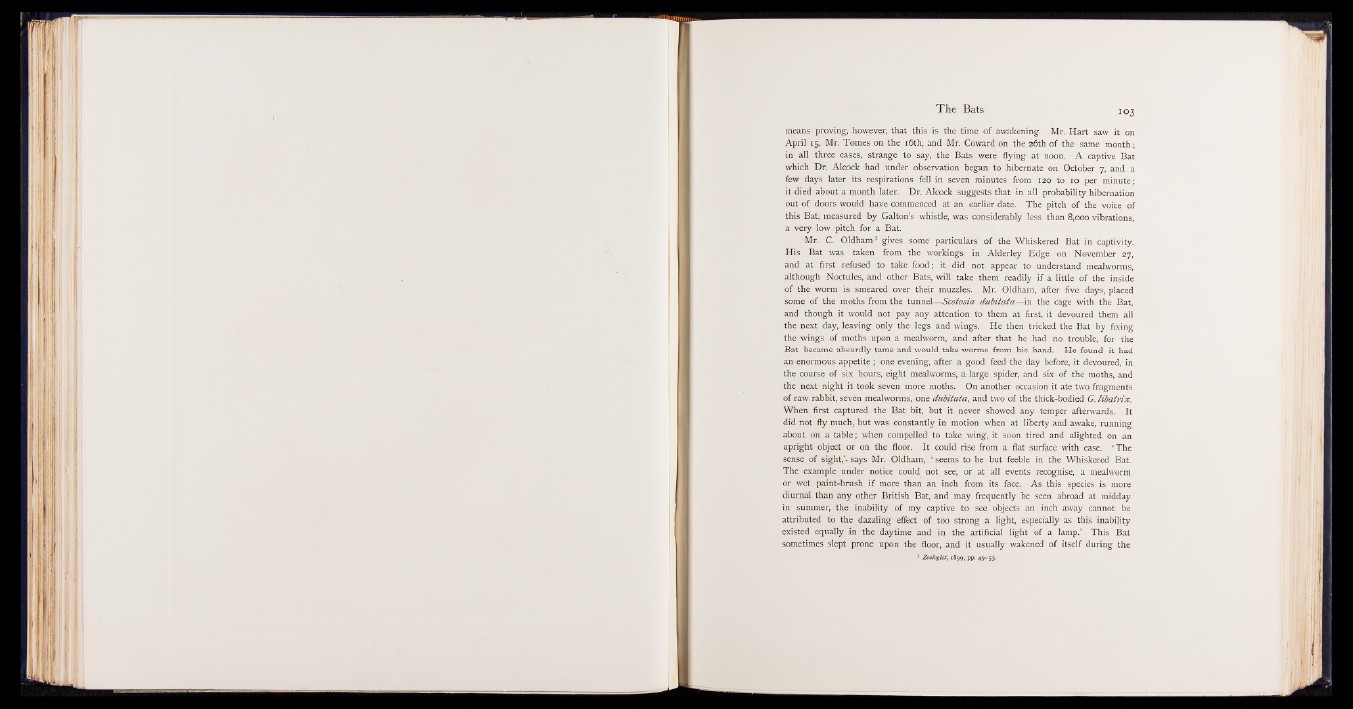
The Bats 103
means proving, however, that this is the time of awakening. Mr. Hart saw it on
April 15, Mr. Tomes on the 16th, and Mr. Coward on the 26th of the same month;
in all three cases, strange to say, the Bats were flying at noon. A captive Bat
which Dr. Alcock had under observation began to hibernate on October 7, and a
few days later its respirations fell in seven minutes from 120 to 10 per minute;
it died about a month later. Dr. Alcock suggests that in all probability hibernation
out of doors would have commenced at an earlier date. The pitch of the voice of
this Bat, measured by Galton’s whistle, was considerably less than 8,000 vibrations,
a very low pitch for a Bat.
Mr. C. Oldham1 gives some particulars of the Whiskered Bat in captivity.
His Bat was taken from the workings in Alderley Edge on November 27,
and at first refused to take food; it did not appear to understand mealworms,
although Noctules, and other Bats, will take them readily if a little of the inside
of the worm is smeared over their muzzles. Mr. Oldham, after five days, placed
some of the moths from the tunnel— Scotosia dubitata—in the cage with the Bat,
and though it would not pay any attention to them at first, it devoured them all
the next day, leaving only the legs and wings. He then tricked the Bat by fixing
the wings of moths upon a mealworm, and after that he had no trouble, for the
Bat became absurdly tame and would take worms from his hand. He found it had
an enormous appetite; one evening, after a good feed the day before, it devoured, in
the course of six hours, eight mealworms, a large spider, and six of the moths, and
the next night it took seven more moths. On another occasion it ate two fragments
of raw rabbit, seven mealworms, one dubitata, and two of the thick-bodied G. libatrix.
When first captured the Bat bit, but it never showed any temper afterwards. It
did not fly much, but was constantly in motion when at liberty and awake, running
about on a table; when compelled to take wing, it soon tired and alighted on an
upright object or on the floor. It could rise from a flat surface with ease. ‘ The
sense of sight,’, says Mr. Oldham, ‘ seems to be but feeble in the Whiskered Bat.
The example under notice could not see, or at all events recognise, a mealworm
or wet paint-brush if more than an inch from its face. As this species is more
diurnal than any other British Bat, and may frequently be seen abroad at midday
in summer, the inability of my captive to see objects an inch away cannot be
attributed to the dazzling effect of too strong a light, especially as this inability
existed equally in the daytime and in the artificial light of a lamp.’ This Bat
sometimes slept prone upon the floor, and it usually wakened of itself during the
1 Zoologist, 1899, pp. 49-53.